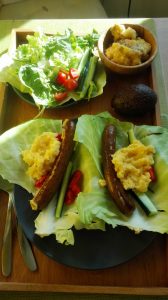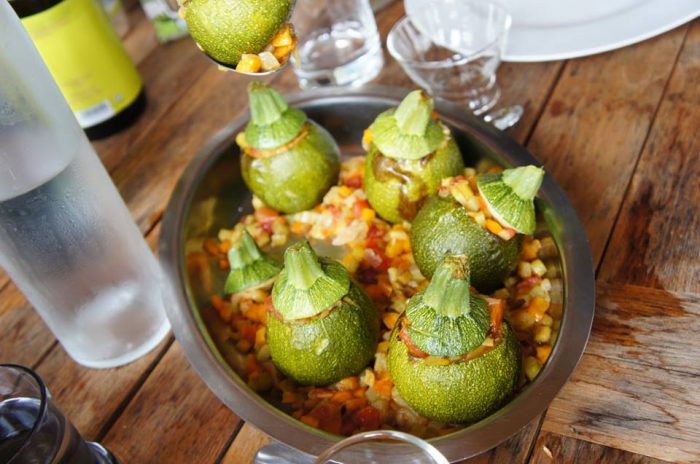If we don’t eat, we can’t survive long and healthy. Beyond survival, we all know that our body, including our brain, bones, and every cell, takes in nutrients from what we put into our mouth (and onto our skin). That process ensures that our cells keep developing and do their jobs, our blood keeps running through our veins, etc. In yoga, we talk about Annamaya kosha as the visible part of the body, the first layer or the physical body, and interestingly it is literally translated as “made of food.” Yet, we rarely do truly stop to take that simple, undeniable truth – “we are what we eat” – really seriously. What do you put into your belly?

Of course, the following only comes from my opinion and experiences and by no means do I claim any medical or professional expertise. Do consult with doctors, dietitians, nutritionists or naturopaths for detailed, personal guidance from experts.
It is easy to get info on new diets and try them out. I grew up in France with several family members (especially women) highly attentive to (obsessed by 😉 ?) their weight and the latest diet. Today, more and more are realizing how essential and impactful food is for our health and many diet styles emerge or re-emerge: vegan, paleo, raw-food, auto-immune, Whole30, Dukan, gluten-free, etc.
My intention here is not to review and expose all types, neither it is to advocate for one particular diet or make you lose weight. Rather my wish is to introduce you to your own type of food (I find the word diet a bit too rigid). I love eating, and especially socializing over eating. So I do not want to dismiss my social life because I have special diet needs or preferences. Yet, I am also committed to my health and well-being and I want to nurture myself by eating what’s good for me. Thus I want to be aware of and at the same time stay flexible with what I eat and drink. Perhaps you feel the same way? I also love cooking but I acknowledge that not everyone feels the same way. You do not have to love cooking before starting exploring and customizing what you eat, but you can be open to the idea that you may start enjoying cooking at some point. Cooking can be really fun and super creative. The most important thing to start is your intention for self-care.
First things first. What products and produce to use? A good starting point is to think organic vs. “regular”. Whether it’s meat, oils, grains or veggies, I encourage you to truly consider the value of reducing the amount of pesticides and other chemicals that comes into your body. Beyond that, there is the whole respect for the animal world, Mother Earth and the soil we all have to share and will leave to our kids. In case you did not get it, I am a fierce advocate of organic or pesticide-free goods as much as possible. But in the end it is up to you! A second important factor is where it is from; in my case I always try to go for a local origin as often as possible. I live in California right now so I am quite lucky to have access with a wide range of produce, but when in Denmark I do not want to solely eat cabbage and potatoes in the winter… So again, it’s about finding the right balance between our values and our needs. Third, I have been more and more curious about what actually is in the processed foods I buy (i.e., whatever I don’t make myself – sauces, crackers, cans, prepared foods…). As a rule of thumb, I just avoid products with “E-xxx202”-type ingredients or ingredients you can’t pronounce (to quote KIND bars) as much as possible. It’s kind of gross how many products there are on grocery shelves with that type of ingredients. So roll up your leaves and take out your binoculars.
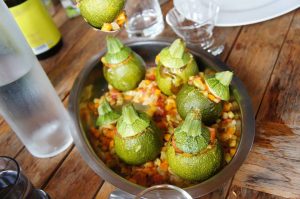
Now you can start experimenting with what type of food “feels” right not only for your body, but also your mood, your energy throughout your day, your sleep… Maybe you are sensitive to allergens you are not even aware of or suffer from low blood sugar and just do not think there is anything you can do to influence it (except eating every 2 hours). I am convinced that you can feel much better, wherever you are today, by trying to make more or less space for some type of aliments. And remember: If you start paying attention and reduce taking in what is not working for you, your body will develop higher sensitivity to what is not serving you. In other words, your “radar power” will increase and you will better notice what truly works for you.
Energy. I have experimented with what works for me to keep my energy going at a sustainable level throughout the day. Before, I just used to think I have to kill the inevitable desire to nap after lunch or getting out of bed by drinking a large coffee. Coffee is good – to a limited extent. But there’s so much more you can try.
Today, I clearly feel the impact of eating gluten (bread, wheat pasta, pizza, etc.) during the day and that rapidly kills my energy. I know what you think: How can I not eat baguette, burgers or pizzas? Be creative, it’s easier than you think. Gluten-free options can be as filling as gluten ones and you will feel lighter as a bonus. Try rice (jasmin, brown, …), quinoa, buckwheat, oat (less gluten-ish) and other foods such as sweet potatoes and seeds. If it’s hard to give up gluten totally, favor the intake of gluten in the evening. My energy also goes down a lot after eating cooked potatoes (although not gluten) but I do much better with sweet potatoes or yams.
In addition, increasing the amount of leafy greens may help boost your energy: not only green salad, but also kale, collard greens, chard, spinach, beet greens… Green juices are also a good habit. Bigger cabbage (savoy, green or red cabbage, etc.) are good too but less “green” and more heavy to digest. Experiment to find the right balance.
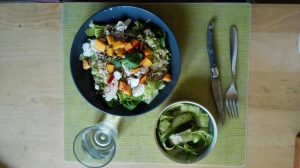
If you want to find what’s right for your energy level, you have to agree to reduce caffeine: GO DOWN IN YOUR COFFEE CONSUMPTION. The thing we forget about stimulants is that their effect diminishes with time and our adrenal glands get tired, which make us very tired in the long term. An they are addictive! Try black or green (or even Pu-her or white) tea instead, if it’s hard to reduce coffee. Also, I encourage you to take daily drops from a tincture made of Eleuthero, an herb that helps reset your adrenals. Adrenals are essential to regulate stress and, with less stress, comes more energy. I have tried Eleuthero for a couple of months, and stopped it for a few weeks when I run out of it.. its effect is striking. When I take it, my energy remains stable throughout the day and in stressful situations.
Variety. Bring as much as variety as you can. A good rule of thumb is to bring as many colors in your plate as you can – from natural stuff and not artificial colorants! It is also more fun to watch and eat different colors. If you go out, ask for the substitute to potatoes/fries or pasta.
Sugar. Sugar is clearly addictive. It can boost your energy 5 min after you eat something sweet, but after 30 min or so you will get tired for another hour or more… Whether or not you are subject to low blood sugar, eliminate any refined sugar-based product (often processed, industrial sweet stuff) and regulate your sugar intake. That may help stabilize your energy and mood (and weight even). For some of us, even 2-3 fruits a day may be too much. Again, experiment. I do best with fruits in the morning. More acidic fruits are less sugary such as cranberries, blackberries, raspberries or even avocados and some types of apples, while strawberries, figs, cherries, and mango are high in sugar. Prefer high-cacao (at least 75%) chocolate, but limit to one or two small pieces a day (not 1-2 bars a day :)) as chocolate is highly addictive (I’m kind of a choco-junkie myself). Substitute white or cane sugar with Agave syrup or Stevia, no sugar but but tastes sweet. Try to avoid jams for a while, even your favorite mom-made.
Seeds & nuts. My favorites (my friend Fanny would know!). I use them in a lot of dishes. They can provide you with a lot of good stuff and calm your appetite if you use them right. If you want to reduce your intake of meat and/or fish, use more seeds and nuts. First, soak your larger seeds and nuts (almonds, cashew, walnuts, sunflower seeds) at least overnight. Soaking will start a sprouting process that eases your digestion and the intake of the good things seeds and nuts want to give you. Of course it’s harder to soak for instance sesame seeds. Ground flax seeds, otherwise you will not get what’s good for you inside. Second, DO NOT HEAT, ROAST or COOK THEM. Cooking nuts and seeds release toxic stuff and can do you more harm than good in the end. Use them raw in your salads, as a decoration on your favorite cooked dishes, add them at the very last to your soups, use them in your breakfast bowl or even prepare your own trail mix with soaked nuts and seeds (a plastic or glass container might help). Use chia seeds in breakfast, if you bath them in your milk, they will grow and release a bunch of antioxidants and other good stuff. I buy seeds in bulk or larger quantities, it is much more economical and they last long.
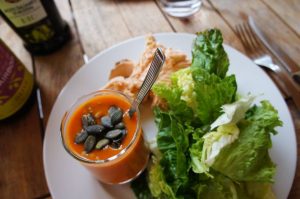
Diaries. I do not suffer from strong milk or lactose allergies. However, I have noticed that my nasal mucous is much less dense and I breathe more freely through my nose if I do not consume cow-milk based products. I can also have a hard time digesting milk, butter, and cream, while yogurt and cheese (thanks god) are better. I am proud of my French roots and giving up good, local cheeses is not an option :). Somehow, goat and sheep-milk based products have fewer effects, so I’d rather stick to them. But if you are up to it – go vegan! Moreover, I have used a bunch of substitutes including soy, almond, oat, coconut or rice-based milk, yogurts or creams. They can totally do the job. Some people are not big fan of soy, but I encourage you to try to see what’s best for you – in your tea, breakfast or liaison. Remember to read the list of ingredients!
Meat & Fish. I am not religious about diet (or pretty much anything) but a strong advocate of finding you own “diet.” I have been vegetarian, vegan, pescatarian (fish only) at times, but I honestly find it hard to maintain full balance in all periods of life with a strict diet. I admit it’s possible with the right discipline, but right now I am more interested in staying tuned to what best serves my body and fit my values. Right now I eat poultry only once a week or so, more fish in general and also a great amount of nuts, avocados, chick peas, lentils and other beans to fill in my needs for proteins, iron and other essential things. My problem with eating too much lentils and beans (including Tempe and tofu) is that it makes me fill more sluggish and heavy, while fish makes me feel great and energized pretty much each time. Experiment yourself. For fish, avoid those with possible lead and mercury (often tuna-type fishes) and prefer organically farm-raised or wild-caught fishes. Fish cans are practical sometimes, but prefer fresh! My parents used to own a fish shop, so I learned to recognize fresh fish (skin or filet shine more, eyes look more alive) and some are much cheaper than you think.
Oils. Two easy things to search for in order to reduce potential toxicity from oils: 1) Buy only cold-pressed (is possible extra-) virgin oils. Second best choice is expeller-pressed oils. If neither cold- or expeller-pressed appears on the etiquette, the oil has been extracted from chemical processes, which increases risk of toxicity. 2) Do not OVERHEAT any oil, especially not olive oil! Around the Mediterranean and now increasingly in other places, olive oil is super popular. Yet olive oil is not a cooking oil and heated at high temperature it releases toxic elements. Instead, use coconut oil, safflower oil, or even butter when you cook. Enjoy the taste of olive oil after your dish is cooked or on salad.
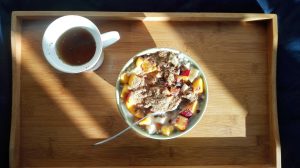
Ayurveda. Ayurveda, an old yogic tradition translated as “science of life” has helped me a great deal to find the right type of food at various times. I won’t explain Ayurveda in details here, but in short this science presents 3 main groups of body constitutions, which all need different types of foods to thrive: in other words, we are all different as a starting point and thus have different needs – not only in general but also depending on the time of the day or year. There is a lot of wisdom to find there.
Other benefits. In addition to more energy and vitality, fewer allergic reactions, and more well-being in general, developing awareness around your food and drink intake will help you increase your ability to focus or even to meditate or be creative. Take note, as such a correlation is highly likely to be true. At the same time, you will enhance your ability to recuperate from those cherished events that you do not want to miss but where it is more difficult to meet all your food needs (weddings, parties, etc.). I enjoy eating and drinking something unusual and not so “angelic” at times without being disturbed afterwards, but naturally it has to remain the exception!
Resources: Organic Food Deliveries, Recipes, and more…
Look around in your community, delivery of fresh products and produce from organic and/or local farms is increasingly popular. Ideas:
SF Bay Area: farmfreshtoyou (organic. use this code CEDR9635 and both you and I will get a discount), imperfect produce (cheaper, local, and ugly), goodeggs (organic and local produce and products. I can also get you a discount if you want to sign up. Contact me)
Denmark: aarstiderne , Dansk vegetar forening, Løs market, Go Green Denmark…
May you be well, healthy, and happy!
Namaste
Cedric
